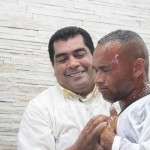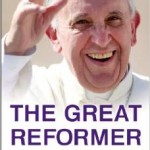It may have gotten a four minute standing ovation from his Bishops, but Pope Francis’ closing remarks to the synod, which I thought were pretty beautifully wrought, are being praised-but-quietly by others, at least as I am surveying today.
It seems to me people aren’t really appreciating what Francis said there — how capably and clearly he let both the “left” and the “right”, the progressives and the traditionalists, know that neither side has a corner on the fullness of the faith or the whole of wisdom, and that his intention (regardless of how anyone in the secular or religious media would like it spun) is to pursue virtue via media; church-wide holiness by the middle road.
I get a sense, instead, of there being a “let down” that seems almost anti-climatic. After all the drama and hyperbole following the release of the first relatio there was an almost palpable sense that when the final document was presented, Pope Francis would end his silence, rise up, and perform a transformative soliloquy fit for opera, or at least worthy of an Oscar.
Some perhaps expected to see the Holy Father become Don Giovanni’s Commendatore, slapping an Ecclesiastical Ban Hammer on the radical traditionalists; others, no doubt, anticipated seeing a Pontiff as Michael Corleone, assenting to doctrine while systematically wiping out any perceived threats to his ambitions.
Yes, I am exaggerating. A little.
Confounding those expectations, Francis dared to close things by saying, essentially, there will be no “winners” until we all get up on the cross with Christ and, from His perspective, take note of where justice and mercy are failing to meet and therefore flourish together. He warned against
— The temptation to come down off the Cross, to please the people, and not stay there, in order to fulfill the will of the Father; to bow down to a worldly spirit instead of purifying it and bending it to the Spirit of God.
– The temptation to neglect the “depositum fidei” [the deposit of faith], not thinking of themselves as guardians but as owners or masters [of it]; or, on the other hand, the temptation to neglect reality, making use of meticulous language and a language of smoothing to say so many things and to say nothing!
Going mostly unmentioned in most commentaries I’ve read is how fully Pope Francis relied on Pope Benedict XVI to relay the urgent need to help Catholic Christians understand their lives as not simply as a series of choices or accidents but as true vocations — and therefore, yes, crosses — to which they have been personally called by Christ:
[quoting Benedict] . . .it is [Jesus Christ] who guides, protects and corrects them, because he loves them deeply. But the Lord Jesus, the supreme Shepherd of our souls, has willed that the Apostolic College, today the Bishops, in communion with the Successor of Peter… to participate in his mission of taking care of God’s People, of educating them in the faith and of guiding, inspiring and sustaining the Christian community, or, as the Council puts it, ‘to see to it… that each member of the faithful shall be led in the Holy Spirit to the full development of his own vocation in accordance with Gospel preaching, and to sincere and active charity’ and to exercise that liberty with which Christ has set us free (cf. presbyterorum ordinis, 6)… and it is through us,” Pope Benedict continues, “that the Lord reaches souls, instructs, guards and guides them.
It is true, and taught rather badly, that the state in which every human being lives his or her life is, in fact, a kind of office, through which we are meant to learn how to serve others and reach our fullest potential — within marriage, or single-parenthood, or the solitary life or the consecrated one — in the specific crucible of agape-infused sacrificial love to which we all must submit.
Because every office is a gift and a crucible; every offering of ourselves to God, in any capacity, is an offering of ourselves to the whole world, and each other, and a burner-off-of our dross.
Again and again, it seems to me, this is all going to come down to understanding agape as more than a word we throw around, but as a lived experience.
The most interesting take I’ve seen on Francis’ speech — and it is interesting precisely because it takes him at his words, without attaching any strings or a personal agenda upon them, comes from Evangelical-turned-Catholic, “Rogue”, Jonathan Ryan, who writes:
The Gospel scorns the distinction of liberal and conservative. It laughs at those pathetic, naked rulers and pushes the church to a higher understanding of Christ’s love. The church will not be a slave to conservatives, who want to use it for a political power base, nor will Christ’s body be bossed around by liberals who think they know best because they are“modern” (whatever the hell that means).
Pope Francis showed us this fact in a profound way.
Read the whole thing.
A couple of other interesting takes on the synod as a whole:
Immersed in our sex- and wealth-saturated culture, we have a difficult time even seeing what that sin no more might look like. We stand like the unrepentant pharisee saying “at least I’m not like those girls who sext,” or “at least I’m not like that greedy CEO over there,” and imagine that we are thus pictures of virtue. Their sins burn so hot mine seem like cool shade in comparison.
The Christian life becomes a game of Find a Worse Sinner than Yourself.
There’s an entire Synod going on right now to discuss the family, but what I haven’t read a great deal about is single parent households. It’s almost as if we don’t rightly matter much. . .In terms of service, I feel as a single parent I literally have nothing of myself to offer the Church therefore I’m not even a blip on Her radar.
Tom McDonald is just “glad it’s over” although it’s really not:
The synod is a process, and the process will continue. We say some alarming things in any vigorous debate. Modern culture suffers from a sexual insanity, and any debate which touches on sexuality–as debate about the family must–will be tense, often controversial, and almost certainly misunderstood both within and without the church. The process and the perception of the process are thus at odds. We shouldn’t fear it, but we should understand it, and continue to do our best to discuss faith in charity, without undue anxiety and with confidence in the Holy Spirit Who guides and inspires us.
So, for another year, at least, we’ll pray that the Bride of Christ (and therefore his Body, because in marriage, we are talking about One Flesh) is guided by the Holy Spirit and is open to that guidance. We’ll wonder, because we are allowed to wonder; it is how we come to knowing. We’ll reason, because the Catholic church reasons through its faith, and refines that faith through reason.
Next October, we will see Synod for the Family 2.0. Imagine what that could all be like if we really do spend this next year praying with sincere hearts, wondering with free minds and reasoning with a mind bent toward Ephphatha!
It could be really great!











